
Nigerian dwarf goats for sustainable dairy
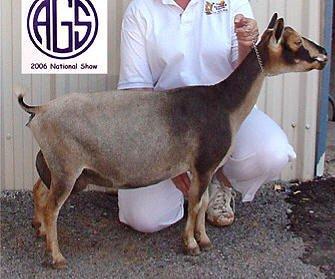 Mark would appreciate it if
you all could talk me out of it, but I'm currently thinking seriously
about goats. Our land is perfect for goats (lots of brush) as
long as I keep them out of the snail-friendly floodplain, and I think
that adding an herbivore to our menagerie would make the farm more
productive and fill an empty ecological niche.
Mark would appreciate it if
you all could talk me out of it, but I'm currently thinking seriously
about goats. Our land is perfect for goats (lots of brush) as
long as I keep them out of the snail-friendly floodplain, and I think
that adding an herbivore to our menagerie would make the farm more
productive and fill an empty ecological niche.
In the past, I've
steered clear because I'm unwilling to follow the lead of my neighbors
and chain a goat, and I didn't trust my fencing ability to keep these
wily animals out of our beloved garden. However, Sharon
Astyk (fondly known
as "blogger Sharon" in our dinner table conversations) assured me that
four foot fencing is enough to keep in her favorite variety ---
Nigerian dwarf goats.
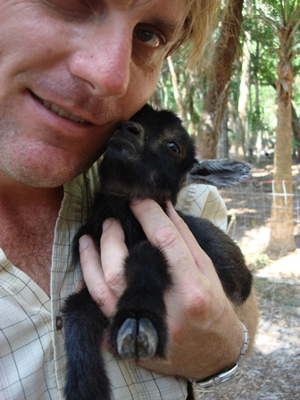 We've been doing a lot of
fencing this year for our chickens and already have nearly a tenth of
an acre of pasture (with two more pastures
partially built.) Since Nigerian dwarf goats are so small, I've
read that you can feed them on 0.13 to 0.16 acres apiece, which makes
goat pastures sound well within reach. In addition, our chickens
won't eat the woodier plants like ragweed and young trees, so it's
likely that we could add goats to the chicken pastures without taking
away much food from the chickens at all.
We've been doing a lot of
fencing this year for our chickens and already have nearly a tenth of
an acre of pasture (with two more pastures
partially built.) Since Nigerian dwarf goats are so small, I've
read that you can feed them on 0.13 to 0.16 acres apiece, which makes
goat pastures sound well within reach. In addition, our chickens
won't eat the woodier plants like ragweed and young trees, so it's
likely that we could add goats to the chicken pastures without taking
away much food from the chickens at all.
Most people plan to milk
year-round, but Sharon reports that if you breed your goats to kid in
the spring when forage is at its most abundant, you can let the goat
dry off for the winter and hardly have to feed any grain. That
means better quality milk and a more sustainable livestock
system. In addition, seasonal milking lets you go out of town
during the off season without finding a milking helper.
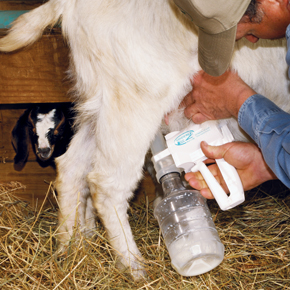 Sharon solves the twice a day
milking problem as well. She recommends milking your goats in the
morning, then putting the kid back with its mother to spend the day
grazing together. That way, you only have to milk once a day
rather than twice and your evenings are free. Meanwhile, Sharon
uses a modified breast pump to do the majority of the milking, which
saves her hands --- my carpal tunnel made the idea of daily milking
unlikely until I learned about this gadget --- and also lets an
untrained friend milk the goat if necessary.
Sharon solves the twice a day
milking problem as well. She recommends milking your goats in the
morning, then putting the kid back with its mother to spend the day
grazing together. That way, you only have to milk once a day
rather than twice and your evenings are free. Meanwhile, Sharon
uses a modified breast pump to do the majority of the milking, which
saves her hands --- my carpal tunnel made the idea of daily milking
unlikely until I learned about this gadget --- and also lets an
untrained friend milk the goat if necessary.
Using the seasonal,
once-a-day milking method, we'd end up with around 25 gallons of
milk from one Nigerian dwarf goat per year, which would fulfill our
dairy needs quite nicely. Sharon reports that milk from Nigerian
dwarf goats tastes just like cow milk and I've read that goat milk in
general is supposed to be easier to digest than cow milk. I used
to love milk until I stopped being able to drink the grocery store
stuff a few years ago, so I'm hopeful that goat milk could put me back
in business. Of course, you also get to eat goat meat in the fall
when those kids grow up.
I'm tempted to buy one
(or two if I think one would be lonely) male dwarf goats this winter to
see how he does on our pasture and with our fencing before committing
to the whole milking endeavor. Males are much cheaper than good
milking does, so it wouldn't be so 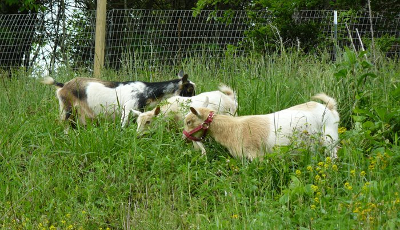 bad if the experiment didn't
work out and we had to eat the goat or sell him.
bad if the experiment didn't
work out and we had to eat the goat or sell him.
All of that said, there
are some very valid reasons not to get goats. First of all,
domesticated animals are a huge commitment, and I'm not sure if we're
ready to expand the menagerie. And I'm not clear on how the herd
dynamics would work out --- could we keep one doe and her kid, bringing
her to a local breeder when she's in heat, or would she be lonely in
the winter? Any more than one goat would mean doubling our
pasture area, which is feasible but more of a two year project.
Speaking of which, are our quick and dirty fences really good enough to
keep in even the tiniest goats? And do goats in the off season
fit our mandatory "can fend for itself for four days while we're out of
town" requirement? Finally, Mark's worried that Nigerian dwarf
goats are too cute to kill, which would make them less enticing.
Please chime in with
other reasons not to try out goats. I need someone to quench the
flame of my desire!
Want more in-depth information? Browse through our books.
Or explore more posts by date or by subject.
About us: Anna Hess and Mark Hamilton spent over a decade living self-sufficiently in the mountains of Virginia before moving north to start over from scratch in the foothills of Ohio. They've experimented with permaculture, no-till gardening, trailersteading, home-based microbusinesses and much more, writing about their adventures in both blogs and books.
Want to be notified when new comments are posted on this page? Click on the RSS button after you add a comment to subscribe to the comment feed, or simply check the box beside "email replies to me" while writing your comment.
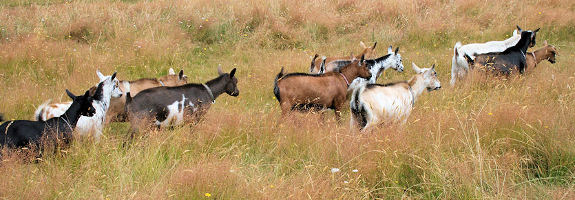

Jumping/climbing is one of the reasons I've been leery of goats, despite their utility on rough pasture and the fact that they are one of the most common meat animals in subsistence households worldwide (after chickens.) The Nigerian dwarf goats are less than two feet high (at the shoulder, I assume), so it's supposed to take much less to keep them in.
They definitely would not be pets! But Mark's worried that they'd be so personable that they'd become pet-like anyway. I suspect that if we go into it with the right mindset, we can keep them livestock.
We have been wrestling with similar thoughts, but are less concerned with the milk option. I too have been concerned about dealing with goats' ability to leave their so called enclosures at will. I've just heard too many stories, so we are considering some meat sheep (Dorpers) as an option for meat and some extra grazing. My wife's uncle raises about 50 black angus cows on our family farm, but as he gets older, I know that he will be getting out of the "cow business". We are seeking an alternative to keeping pastures grazed, and the option to finish livestock on grass is high on our list.
It sounds like you have thought out all of the goat benefits and challenges, and that you have a good plan to move forward if you decide too. Starting with just a couple to test your fences is a good idea.
Jeremy
They're excellent foragers, so they should be less work then most other livestock and you should be able to leave them without worry as long as you're certain they're contained. I was reading a blog a couple months ago written by a guy that uses pet goats as pack animals when he goes camping. Tthey are trained to follow him off lead and lay down to bed at night next to his tent. he can go on 3-4 day excursions to places with plenty of green foliage and not even have to worry about watering them!
You'll definitely need to get at least 2, since goats are herd animals. I have very limited experience with them but horses are very similar in this aspect- they need a companion to feel normal- otherwise you're asking for a dysfunctional trouble maker!
My brother has three fainting goat does. He got them just to keep the steep rocky hillside clean of undergrowth. No breeding or milking. His goats can climb trees and love to bed under the overhangs on the hill. But he keeps them in with some salvaged chainlink fencing that is only 4'. And the goats your looking at are smaller and not as agile as his. I would be more concerned with them pushing under. Also goats don't wander much so I think you could let them out some during the day as long as your there to keep them in the undergrowth and not the garden.
Problem: They are extremely personable and freindly. My brother tried just one and it was unhappy. His family and mother-in-law have feel in love with his hedge trimmers. He only wanted to keep them until they killed of most of the undergrowth but now they are to attached to sell them. But mind set makes a difference. I have one very freindly cow and we raise one calf a year. They are cute and momma cow teachs them to be just as freindly with us. But we know as cute as they are, they are going to end up in the freezer.
Good luck.
If chickens are escape artists, goats are Houdinis on steroids. The will climb trees to go over fences. That said, I kept and milked goats once. Taste the milk. The Nubian's was like cow milk. The Toggenberg's was wild tasting and I couldn't stomach it.
At the time I lived in an area as isolated as yours, and, in winter, turned the goats loose in the morning after milking and let them run the mountains. In the evening I'd rattle corn in a can and after five or ten minutes they'd come running. So yes you can go off for a few days and leave them if they don't need milked.
Also, the goats shunned grass and hay. They much preferred weeds and tree leaves.
The Toggenberg had a habit of waiting till I was stripping her and then reach back and tip the pail. As I recall, we fed the goats a mixture of grains and minerals to get good milk production.
Goats are intelligent and will quickly charm you.
Heather --- See, that's the kind of feedback I need --- solid reasons not to get two goats! The problem is that blogger Sharon shot down all of the reasons that made me adamantly opposed (getting out, being too big to easily handle, etc.) I need more reasons not to get goats!
The problem is that blogger Sharon shot down all of the reasons that made me adamantly opposed (getting out, being too big to easily handle, etc.) I need more reasons not to get goats!
Jeremy --- I pondered miniature cows at one point, but the trouble with cows is that they really require grassy pastures, and we just don't have that. Sheep are another option we'd considered, but they're not quite as brush-eating as goats. (Although easier to fence in, I've heard....) In your situation, though, both make a lot of sense.
Phil --- I'm glad to hear goats fit the 3-4 day neglect criteria. I was afraid I would have to get at least two --- that's definitely a strike against them. Although, with all of the deer moats/pastures I have in mind, two miniature goats might not be that much of a stretch before long.
Erich --- The pet issue is the biggest one, I think. Before we moved to the farm, Mark had a real bond with his uncle's goats, and I think he's afraid he'd do the same with any we got. On the other hand, he wasn't a farmer then, and we now have some extremely personable chickens, but still feel fine eating them.
I'm currently pondering a "foster goat" --- see if someone in the neighborhood has dwarf goats and wants to farm one out for a month or so to save on pasture. That way we'd get to try it out with the least repercussions.
Matthew --- Unhelpful! Biomass production was one of the reasons I was interested. I wish you hadn't reminded me.
Jackie --- Excellent point about a solitary goat being more likely to turn into a pet. Sounds like at least two is a definite must.
Daddy --- I'm glad you reminded me of those goat stories. As moated as our central garden area is becoming, we almost could turn goats out to range the surrounding countryside at certain times of the year with just a little additional fencing. That would definitely make it easier to find enough grazing ground for them.
The escape artist factor is what's always scared me. That's why I like the idea of the dwarf goats, although it's possible that a little goat would just escape in different ways than a big goat...
I decided awhile ago that when I get to go back to the land, goats are one of the critter types that I will be including on the farm. All of the positives you listed are the reason for it and I think it's a natural progression for those wanting to live a sustainable and self-sufficient life. I agree with the idea of trying out a couple goats to see what it would be like to live with and wrestle them, but if it turns out that they are too easy to love, maybe sheep are really the answer.
I suggest sheep because the meat and biomass options are still very good ones, and after your goat trial you may have a good clearing for sheep instead. The milking of sheep is an older tradition than even milking cows, although people don't tend to drink the milk straight, it's usually transformed into milk, yogurt, and cheese instead, which leads me to believe that it doesn't taste as good fresh? Great thing about sheep's milk too, is that apparently it freezes really well with little affect on whatever product you're trying to transform it into. I also think that while sheep are cute, they're not CUTE like those ungodly adorable Nigerian dwarfs, and will be easier to slaughter when the time comes. Keeping sheep will still add in a new, needed dimension to the farm. it's a thought anyway.
Goats are awesome! Yay goats!
(I know nothing about raising them, I just think they're cool. Juniper (age 2) really likes 'em too. :^)
If not for the need for multiple goats, I'd be getting them for our own tiny city yard (already have hens here, milk and eggs would be awesome) Everyone I have talked to about goats emphasized that you need to have AT LEAST two, they are REALLY unhappy as single animals, but need a companion of their own species, and our yard is just too small for two goats and their kids.
Other than that, they do sound like a good and useful option for your place, as long as the "pet factor" can be dealt with. I knew one family when I lived in Idaho that named their two steers "Burger" and "Meatloaf" as a way of reminding themselves of that
I don't know if the sheep could compete with the best goats for devouring weedy / woody plants, but the Dorper sheep breed was originated in South Africa under some pretty tough environmental conditions. Check out dorper.org for more info. Oh, and you don't have to shear them.
You wanted to be swayed away from goats. Just throwing in another two cents . . .
Brandy and Jeremy --- I think you may have sold me on sheep (which would make Mark very happy.) Whenever we talk about livestock, we've always talked about sheep being our next step, partly because Mark loves lamb, partly because a lot of people raise hair sheep around here, and partly because they just seem more like a starter non-chicken livestock breed than goats or cows.
What bogs me down about sheep is that they're large, which means more serious fencing and more acreage. However, as I was reading your comments, I started thinking "If there are dwarf goats, maybe there are dwarf sheep." Sure enough, there are various types of miniature sheep, most notably Miniature Cheviot Sheep, which seem to be a similar size to Nigerian Dwarf Goats. Presumably that means you can use similarly short fencing and small pastures for them.
On the plus side, sheep would let us explore the caprine world without dealing immediately with milking (which is what I was thinking of when I pondered starting with a couple of male goats.) The Miniature Cheviots are billed as being extremely hardy, being able to live outside in all weather with nearly no supplemental feed, and are almost certainly lower work than dairy goats are.
On the minus side, it sounds like sheep aren't nearly as good brush-clearers (although that does seem to depend on the breed.) We wouldn't get milk. (Yes, I know you can milk goats, but there are a lot of other things you can milk too, and I think it's likely not very worthwhile to do it.)
I guess I've got more research to do on how well sheep clear brush, how much acreage they need, etc.
Alison --- I wonder whether two is enough or whether you really need more than that?
Rebecca --- That's good data, and I would be more leery if blogger Sharon hadn't specifically written that she has carpal tunnel syndrome and couldn't milk more than a couple of goats per day, but that once she got her automatic milker, it was no longer a problem. I think that the goat milkers don't really operate exactly like human breast pumps --- from the brief bit I read, it almost looked like you squeeze something once and then just wait as the milk (slooowly) trickles out.
Josh --- Also unhelpful.
Heather --- I know I like goat cheese, so I'm not terribly concerned about the milk. That said, goat milk taste is very breed specific and I've been told that Nigerian dwarf goats (and Nubians, I believe) make milk that tastes nearly indistinguishable from cow milk. It also depends a lot on how carefully you clean the udders before milking, if I remember right.
We usually get someone to come in and check on the farm halfway through if we're going to be gone longer than four days. Lucy is very self-sufficient and has an automatic feeder for trip times, so she does fine. She generally just sits in front of the feeder and stares at it for days on end....
You have never smelled anything as filthy as an uncastrated male goat. They will urinate on their faces as cologne, and give off odors you can't imagine. Get two wethers and you will be much happier.
Do Nigerian Dwarves have horns? Consider de-horning if you don't like doing this once or twice a year....
On the brush clearing front, my experience with my goats leads me to believe that you will be disappointed. If they can see through the fence, they will eat the one or two species they prefer, then stand in the middle of a still heavily vegetated paddock and cry to be let into the next pasture (or your garden). They definitely subscribe to the "Grass is always greener" philosophy.
Also, feeding them hay is exasperating.
On the bright side, my goats forage of choice is kudzu. On the down side, they don't eat the woody stems, just the tender new stems and the leaves.
And last, but not least, goats in a pasture leave their most of their manure in the pasture- good for the pasture, but hard to collect and use in the garden.
Expect the e-mails that you have won free Nigerian dwarf goats to come pouring in.
You just need to make a little payment to some dodgy fellow in Nigeria for transport!
I have a small flock of sheep. There will be times when you have to dag, dock, crutch and shear them but otherwise than that, they pretty much look after themselves. As long as they have enough food, in my case, lots of grass, then I've never had to supplement their feed. Regular paddock rotation, as with all other stock animals to reduce parasite count, etc is important. I've also been away for over two weeks regularly with no one house sitting and came back to find all was well. The only time I would not go away is during lambing season. Good luck with your decision making! It will be interesting to see what happens if you go ahead and get goats. I've heard they can be very personable and I would find it tough to kill them for meat. I didn't find it easy to kill our first sheep.
Eric --- I can't tell from your blog posts what kind of goats you have, but from what I've read, it sounds like goats can either be awesome brush-clearers or terrible ones depending on their breed. Sounds like you might have gotten the short end of the stick....
As for manure --- we would house them in the chicken coops at night, so we'd get accumulated manure there just like we do with the chickens. Sure, it's only half to a third of total manure, but it definitely adds up and is great for the garden!
Roland --- That's hilarious! I clearly should have known better.
I clearly should have known better.
Sheila --- Looks like the votes are about evenly divided between sheep and goats. Good thing Mark gets the final say and doesn't read all the comments....
Hannah --- I really appreciate you sharing your sheep experience! The miniature sheep breeds I'm looking at don't have to be docked, and some of the ones I'm considering don't have to be sheared either. (We're most interested in meat sheep.) That said, I'm sure there would still be a lot to learn!
Hello, I love this page, and as a new Nigerian Dwarf goat farmer I sure can use the tips! I was fascinated by that modified breast pump that was used in that picture to milk goats. It seems like a great way to get around carpal tunnel syndrome. How did you make it? Are you selling them along with those ingenious chicken waters? Let me know!
Thanks so much for inspiration and products too,..online ordering still happening?
Thanks Jack.
Jack --- I stole the picture of the automatic milker from another site --- click on the photo and you'll go to their sales page. There are a few different ones like it out there, so you might want to shop around.
You can still buy our chicken waterers online, although they're over on our sister site now.
Good luck with your new goats!
You, and several other people in the comments, have mentioned larger breed goats being Houdini on steroids, but Nigerians being more docile. Not so!! I too heard this and got 2 wethers to start with. Since then I have spent nearly every day chasing them down and putting them back in our pasture. Trust me, they have plenty to eat. They love to test the fencing! Every day! I had 4' fencing (was told that was adequate), after multiple stages of reinforcing and adding height, I finally replaced all the 4' (150' of it) with 6.5' fencing (especially needed if any trees are near the fence). Our one goat can clear a 5' fence (going over), the other is an expert at going under. Most of our fencing has now been staked at the bottom or has heavy 2x6 boards attached to the bottom. I since learned because they are smaller they are much more agile. Houdinis!! The other issue with your plan is that they with destroy (smash, trample) much more than they will actually eat. A big herd is forced to eat everything. A few have the luxury of eating only the best parts and leaving the rest.
Hope that helps!